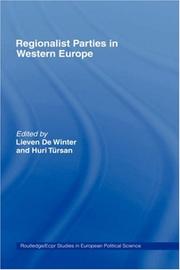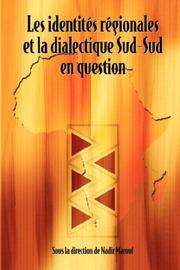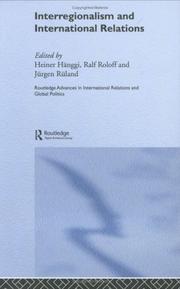| Listing 1 - 10 of 352 | << page >> |
Sort by
|
Book
ISBN: 9871751621 Year: 2018 Publisher: Córdoba : Universidad Nacional de Córdoba.,
Abstract | Keywords | Export | Availability | Bookmark
 Loading...
Loading...Choose an application
- Reference Manager
- EndNote
- RefWorks (Direct export to RefWorks)
This book explores the economic, commercial, cultural, and social integration between the northern region of San Juan in Argentina and the IV Region of Coquimbo in Chile. It emphasizes the significance of the bioceanic corridor as a crucial channel for facilitating this integration. The work delves into historical precedents and current conditions of both regions, highlighting the challenges posed by the Andes mountain range. The author aims to showcase the collaborative efforts needed from both countries to overcome geographical barriers and enhance mutual development. The intended audience includes scholars and policymakers interested in regional integration and cross-border cooperation.

ISBN: 128095857X 9786610958573 9048504678 1429454660 9781429454667 9789056294281 9056294288 Year: 2006 Publisher: [Amsterdam] Amsterdam University Press
Abstract | Keywords | Export | Availability | Bookmark
 Loading...
Loading...Choose an application
- Reference Manager
- EndNote
- RefWorks (Direct export to RefWorks)
Concentrating on three countries, Spain, France and the United Kingdom, and three regional case studies of Galicia, Brittany and Wales, this book offers an analysis of the development of political regionalism after regionalisation.
Regionalism --- Human geography --- Nationalism --- Interregionalism

ISBN: 1134712006 1134712014 9786610111275 1280111275 0203169395 9780203169391 9780415164375 0415164370 6610111278 9781280111273 9781134712007 9781134712014 9781134711963 Year: 2003 Publisher: London New York Routledge
Abstract | Keywords | Export | Availability | Bookmark
 Loading...
Loading...Choose an application
- Reference Manager
- EndNote
- RefWorks (Direct export to RefWorks)
Political parties --- Regionalism --- Human geography --- Nationalism --- Interregionalism
Book
ISBN: 9781800373747 Year: 2024 Publisher: Cheltenham, UK : Edward Elgar Publishing,
Abstract | Keywords | Export | Availability | Bookmark
 Loading...
Loading...Choose an application
- Reference Manager
- EndNote
- RefWorks (Direct export to RefWorks)
"This timely Handbook offers a detailed cross-policy assessment on the need, locale and impact of regional cooperation and integration, addressing how the principles of regional integration have affected multi-level governance and subsequent public policy. Individual chapters provide explanations of what regional cooperation means in a specific policy area, identify relevant theories, and present empirical evidence to support the arguments outlined. The Handbook of Regional Cooperation and Integration brings together a diverse range of expert contributors who deftly explore regional cooperation across a number of key policy areas, including migration, trade, the digital sphere, finance, security, democracy and higher education. Through a comprehensive analysis of the nature of and need for regional cooperation in today's world, this Handbook argues for greater and more pressing discussions on regional policy, the value of integration and its resulting application in organisations. A crucial text for global governance, international relations and public policy academics and students, this is also an invigorating read for regional studies scholars. The Handbook 's in-depth study of practical applications makes this suitable for public officials in the sector, as well as regional organisation and think tank staff"--
Federal government. --- International cooperation. --- Interregionalism. --- Regional planning.
Book
ISBN: 9811593884 9811593876 Year: 2021 Publisher: Singapore : Palgrave Macmillan,
Abstract | Keywords | Export | Availability | Bookmark
 Loading...
Loading...Choose an application
- Reference Manager
- EndNote
- RefWorks (Direct export to RefWorks)
Regionalism --- Civil society --- Human geography --- Nationalism --- Interregionalism --- Social contract

ISBN: 1282901486 9786612901485 2869784112 2869783671 2869782853 9782869784116 9782869781955 2869781954 Year: 2007 Publisher: Dakar Codesria
Abstract | Keywords | Export | Availability | Bookmark
 Loading...
Loading...Choose an application
- Reference Manager
- EndNote
- RefWorks (Direct export to RefWorks)
This book highlights the importance of Pan-Africanism in view of reasserting its pivotal role in the economic integration of the continent. For Africans to co-exist and aspire to a much needed dynamic and social community, there is need for a common understanding of their shared histories and projects. The contributions analyse regional identities that derive from an observed syncretism between traditional culture, Islamic religion and modernity. The example of interregional relations is tangible proof of the difficult negotiation of imposed international axiological constraints. From this per
Arabs --- Interregionalism --- Africa, North --- Africa, Sub-Saharan --- Relations --- Economic conditions.
Book
ISBN: 1317084691 1283480050 9786613480057 1409438740 9781409438748 9781409438731 1409438732 9781315599212 9781317084686 9781317084693 9781138261686 131559921X 1317084705 Year: 2012 Publisher: Farnham, Surrey Burlington, VT Ashgate
Abstract | Keywords | Export | Availability | Bookmark
 Loading...
Loading...Choose an application
- Reference Manager
- EndNote
- RefWorks (Direct export to RefWorks)
This book explores neglected aspects of the key relationships between Canada, Mexico and the United States, with the authors in this book addressing vital issues which bind this global region together, including Indigenous peoples, epistemic communities, security, migration, civil societies, democracy, identities and culture. Via a thorough examination of these issues, the historical, sociological, economic, and political aspects of regional linkages are highlighted.
Regionalism --- Human geography --- Nationalism --- Interregionalism --- North America --- Politics and government --- Economic integration. --- Turtle Island (Continent)

ISBN: 1134236719 1280290293 9786610290291 0203008324 9780203008324 0415360579 9781134236664 9781134236701 9781134236718 9780415360579 9780415479721 1134236700 041547972X Year: 2006 Volume: 38 Publisher: London: Routledge,
Abstract | Keywords | Export | Availability | Bookmark
 Loading...
Loading...Choose an application
- Reference Manager
- EndNote
- RefWorks (Direct export to RefWorks)
Interregionalism, the institutionalized relations between world regions, is a new phenomenon in international relations. It also a new layer of development in an increasingly differentiated global order. This volume examines the structure of this phenomenon and the scholarly discourse it is generating. It takes stock of empirical facts and theoretical explanations, bringing together with clarity and concision the latest research on this key area. This essential new book: - traces the emergence of interregionalism and reviews the latest literature - provides a conceptual and theoretical framework for study - includes case studies of inter-regional relations between: Asia and America; Asia and Europe; Europe and America; and Europe and Africa. - delivers comparative analyses and special cases such as continental summits and interregional relationships beyond the Triad. - summarizes and evaluates the findings of each chapter, providing a basis for further research. This is a key reference book for students and researchers of regionalism, global governance and international relations.
Interregionalism. --- Inter-regional relations --- Interregional relations --- Transregional relations --- Transregionalism --- International relations --- Regionalism
Book
ISBN: 3030645762 3030645754 Year: 2022 Publisher: Cham, Switzerland : Palgrave Macmillan,
Abstract | Keywords | Export | Availability | Bookmark
 Loading...
Loading...Choose an application
- Reference Manager
- EndNote
- RefWorks (Direct export to RefWorks)
This book shows how regional cooperation and integration have increased massively in scale and scope in recent years, as developing countries seek new ways to shield themselves from economic turbulence and to kick-start their economies in the face of stagnant global demand. The trend is partly a defense mechanism against the limitations of the international financial system, but also reflects a wider search for new and different growth paths more appropriate with developing countries increasing economic and political voice. As a consequence, the landscape of financial and monetary mechanisms has changed dramatically, especially in the ten years since the economic crisis of 20072008.
Regionalism --- Developing countries --- Economic integration. --- Foreign economic relations. --- Human geography --- Nationalism --- Interregionalism
Book
ISBN: 2759234657 Year: 2022 Publisher: Versailles : Quae,
Abstract | Keywords | Export | Availability | Bookmark
 Loading...
Loading...Choose an application
- Reference Manager
- EndNote
- RefWorks (Direct export to RefWorks)
The crises we are going through call into question the models of society on which our priorities and actions are based. How can we regain the capacity to act for an ideal of social and ecological justice? How can How can we remobilise our senses and inhabit our territories with awareness and responsibility? Various avenues are being explored by the international community, States and civil society to make the relationship between social well-being and the state of the environment more explicit. But none of them seems to be able to really take root in the decision-making process. The commons deal with these relationships in a sensitive and reasoned way. This book is the result of 20 years of committed research and transdisciplinary thinking by a group of researchers involved in international cooperation with Southern countries (jurist, economist, modeller, sociologist, geographer, ecologist, agronomist, computer scientist). By simultaneously apprehending the needs of humans and non-humans, the common property approach to land and resources presented in this book invites us to identify and invest in the room for manoeuvre that will allow the diversity of users to assert their prerogatives and assume their duties. The proposed social innovation constitutes the crucible for the inclusion of non-humans in collectives that are instituted, if not sometimes institutionalised. The "actors of living together" thus acquire a capacity for analysis and commitment that they are obliged to make explicit; they mobilise tools and methods that facilitate collective action; and they seek to reach agreement in order to deal with uncertainties. The strengthening of social ties and the resulting ecological awareness are the driving force behind new projects for territories to be co-constructed based on a "shared experience" and a rethought governance. This book is intended for students, political and territorial actors, scientists, development operators, representatives of civil society, in a word, all the actors of the living together mobilized in front of the social and ecological emergency at the scale of the lived spaces.
Interregionalism. --- Inter-regional relations --- Interregional relations --- Transregional relations --- Transregionalism --- International relations --- Regionalism
| Listing 1 - 10 of 352 | << page >> |
Sort by
|

 Search
Search Feedback
Feedback About UniCat
About UniCat  Help
Help News
News